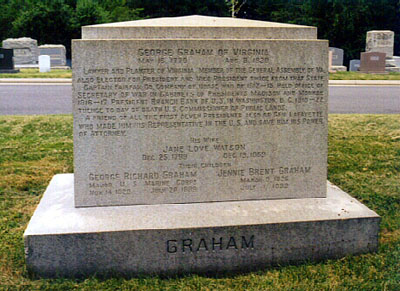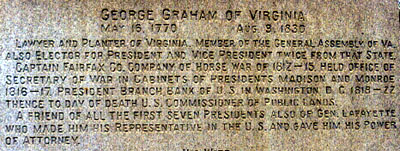Born in Dumfries, Virginia, in about 1772, he graduated from Columbia College in 1790. He began the practice of law in Dumfries,but later settled in Fairfax County, Virginia, where he recruited the “Fairfax Lighthorses” which he led in the War of 1812.
He served as Acting Secretary of War, 1815-18, and then was sent on a perilous mission to Galveston Island, Texas, where General Lallemande, the chief of artillery in Napoleon’s army, had founded a colony with 600 armed settlers, whom he presuaded to give up their undertaking and submit to the United States Government.
It is also said that he was instrumental in saving the Government $250,000 by concluding the “Indian Factorage” affairs. He was also instrumental in the founding of the United States Military Academy at West Point, New York. He died in Washington, D.C. in August 1830 and was originally buried in Congressional Cemetery in that city, being re-interred in Section 3 of Arlington National Cemetery, among members of the Graham and Davenport families.
His private monument in Section 3 states:
“Sacred to three generations of war veterans whose ancestors after
1638 took an active part in all colonial and Indian wars.”
GRAHAM, GEORGE (1772-1830). George Graham, lawyer, soldier, banker, and public servant, son of Richard and Jane (Brent) Graham, was born in Dumfries, Prince William County, Virginia, about 1772. He graduated from Columbia College (now ColumbiaUniversity) in 1790 and practiced law in his native town. He represented his county in the Virginia General Assembly and raised and commanded the Fairfax Light Horse during the War of 1812.
James Monroe appointed Graham chief clerk of the War Department in 1814, and he served as secretary of war ad interim from October 16, 1816, to December 9, 1817. He became known as a troubleshooter in the War Department. In 1815 he was appointed a member of a commission to treat with the British regarding the settlement of the War of 1812. Later he became a specialist in Indian problems.
In 1818 he was commissioned a special agent and sent on a confidential mission to Texas to determine the status of the Napoleonic exiles who had attempted to establish the colony of Champ d’Asileqv on the Trinity River. Graham arrived at Galveston in a smuggling boat in the late summer of that year. The French colony had alreadydisintegrated when he arrived, but he took occasion to consult with Jean Laffiteqv and to inspect the Texas coast on behalf of the United States. The United States claimed Texas at that time on the basis of the Louisiana Purchase, but little was known about it. Graham was impressed by what he saw and recommended that his governmentoccupy Texas immediately. The following year, however, the United States and Spain signed the Adams-Onís Treaty,qv which settled the international boundary at the Sabine River. Graham’s account of his mission stands as the first Anglo-American account of a sea voyage to Texas (from Calcasieu Lake, Louisiana, to Galveston Island, after anoverland trip by horseback) and gives an interesting view of Laffite and Galveston Island in 1818.
Graham was first married to a widow, Elizabeth Mary Anne Barnes (Hooe) Mason; they had two children. His second marriage was to a Miss Watson, and they also had two children. Graham was president of the Washington branch of the Bank of the United States from 1817 to 1823. From 1823 until his death in August 1830 he served ascommissioner of the general land office of the United States.
Graham, George Born: 1772 – Died: 9 August 1830
Yesterday morning at 2 o’clock, at the residence of Mr. Robert Y. Brent, near this city, George Graham, Esq. Commissioner of the General Land Office. — An obituary notice will be attempted by the writer of this article, for an early number of the National Intelligencer, which may, in some measure, be suitable to the melancholy occasion, and exhibit a faint outline of the distinguished merits and character of this most valuable and estimable gentleman.
The National Intelligencer, August 26, 1830
The Late George Graham
The short notice which was published of the death of George Graham, Esq., late Commissioner of the General Land Office, immediately after it occurred, has served to spread the intelligence of that event, and to excite the sympathy and regret of as numerous and respectable a portion of the whole community, as the death of almost any other individual belonging to it could occasion. It took place, as has been already stated at the house of a friend and relative, Robert Young Brent, Esq. in the neighborhood of this City, in the morning of the 8th inst.
The union of the highest intellectual endowments, with a correspondent cultivation and improvement of them, by assiduous study, judicious research, and an extensive experience in useful and honorable pursuits, eminently distinguished and characterized the deceased, in private and in public life; but these qualifications, valuable and useful as they are in themselves, were in him adorned, in a most eminent degree, by the qualities of a heart of the purest benevolence, and by an innate and a lofty sense of honor, which served to invest them with their true value, and to give them their proper efficiency and direction, within the sphere of his means and opportunities.
Mr. Graham was the eldest son of Richard Graham, Esq. of Dumfries, in Virginia, from his marriage with Miss Brent, the fourth daughter of George Brent, Esq. of that neighborhood; and much of the excellence and undeviating correctness of his character and conduct, in every stage and vicissitude of his subsequent life, may be justly ascribed to the truly maternal fondness and solicitude of that estimable lady, in training his youthful mind to the principles of virtue and truth, and above all, to the brightness of the model, which she, herself, exhibited, in her own life and character, in all the excellencies peculiar to her sex.
After having accomplished his academic and collegiate studies in the then best institutions of the United States, with great advantage and improvement, he was for several years employed by his father in superintending the location and survey of extensive tracts of land, which he owned in the Western country; and, soon after his return from this service to Dumfries, his native place, he married the widow of George Mason, Esq. of Lexington, in the neighboring county of Fairfax, of which county he then became a resident.
Here his merits and talents soon pointed him out to the freeholders of that county, as a fit person to represent them in the Legislature of their State, and he was accordingly almost unanimously elected for several successive years, as one of the delegates of that county, to the General Assembly of Virginia. He served as elector, also, of President and Vice President of the United States twice of thrice during this time, giving his vote upon the first occasion to Mr. Jefferson, and upon the others to Mr. Madison, for the office of President.
During the late war between the United States and Great Britain, and at a very gloomy period of the contest, it is understood that President Monroe, then acting as Secretary of War, who had known him intimately and thoroughly from his earliest youth, and was well acquainted with the sterling worth of his character in all its bearings, offered him a high military rank in the service of the country, and the circumstances prevent him at the time from the acceptance of it; but an occasion soon afterwards happened, which enabled Mr. Monroe, to evince a still higher confidence, perhaps, in his talents and knowledge of public affairs, by associating him with himself in the care of the Department of War, that he might devote more of his own attention to his duties as Secretary of State. He was employed in this way, greatly to the advantage of the public service, and to the satisfaction of those who had transactions with the Department of War, for a considerable length of time; when the then President Madison, assigned all the duties of that Department to him, as acting Secretary of War. Throughout the war, and for some time after its termination, he continued to be employed in this and other stations of trust and confidence in the public service, at the Seat of Government; and upon the establishment of the present Bank of the United States, or soon afterwards, and the location of a branch of it in this city, he was appointed to the presidency of the branch, which he retained until he was appointed Commissioner of the General Land Office, upon the transfer of Judge McLean from that station to the office of Postmaster General of the United States, and he occupied this place till the time of his death.
From what has been said, it would be superfluous to add, that in the relations of domestic, social, and public life, the deceased fulfilled, with exemplary kindness and philanthropy, and with the soundest judgment and discretion, all the obligations incident to these several relations. Having become a widower by the death of his first wife, he married some years ago Miss Jane Watson, the daughter of James Watson, Esq. of this city, and from both his marriages he has left small but interesting families, with an afflicted widow, to every individual of whom his lamented death will prove one of the severest and most trying calamities which can ever befall the domestic circle.
The writer considers it a tribute which he owes to the memory of the deceased to record this imperfect sketch in relation to his character and service; and it may likewise serve as a faint memorial of the high and distinguished estimation in which they were so justly held.
Cyclopedia of American BiographyGraham, George, cabinet officer, was born in Dumfries, Virginia, in 1772. He was graduated at Columbia in 1790; practiced law in Prince William county, Virginia, removed to Fairfax county and on the declaration of war against Great Britain in 1812 he recruited the “Fairfax light-horse” and commanded the troop during the war.
When General Armstrong retired from the war department in 1813, Graham took charge of the office as chief clerk and continued in that office under Secretaries James Monroe, 1814, William H. Crawford, 1815-16, and Isaac Shelby, 1817, and when the latter declined the nomination Mr. Graham was secretary of war ad interim until the office was assumed by John C. Calhoun, the same year. He continued as chief clerk under Mr. Calhoun and in 1818 at the request of the secretary, visited the threatened French armed settlement at Orcoguises Bluffs, Texas, and finding the colonists on Galveston island en route for the bluffs, he induced them to abandon their plans. He was president of the Washington branch of the Bank of the United States, 1819-23, and commissioner of the U.S. land office, 1823-30. He died in Washington, D.C., in August, 1830.
GRAHAM, GEORGE
CAPT GRAHAMS CO CAV 2 VA MIL SW WAR OF 1812
- VETERAN SERVICE DATES: Unknown
- DATE OF DEATH: 08/09/1830
- DATE OF INTERMENT: Unknown
- BURIED AT: SECTION 3 SITE 1989
- ARLINGTON NATIONAL CEMETERY
Michael Robert Patterson was born in Arlington and is the son of a former officer of the US Army. So it was no wonder that sooner or later his interests drew him to American history and especially to American military history. Many of his articles can be found on renowned portals like the New York Times, Washingtonpost or Wikipedia.
Reviewed by: Michael Howard


